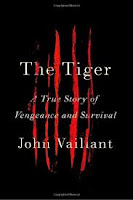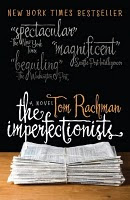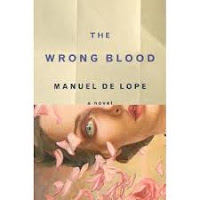Blue Door/HarperCollns
2010
originally published 2009, Allen & Unwin, Australia
327 pp
To be quite blunt, I very nearly put this book down shortly after I started it, but good little reader that I am (and because I felt guilty I haven't posted a book to Jo's Aussie Authors challenge) I soldiered on. And I'm happy I did. As a sidebar, if you want to get anything out of this novel, you absolutely must see it through to the end. Otherwise don't bother to pick it up.
Related in true magical realism style, Wonders of a Godless World won the 2009 Aurealis Award for Science Fiction. The main character is known only as "The Orphan," a young woman who came to live at a mental hospital on an unnamed island after her mother died, and it is through her eyes that the story is related. She lives among the hospital's patients, doing chores & helping with some of the patients in exchange for her keep. The orphan can neither speak nor process the words of others, has no understanding of the world at large, and lives a rather quiet, uneventful and rather isolated life. Then one day, a new patient arrives, an enigmatic and catatonic stranger no one's ever seen on the island before. Somehow, the orphan pulls it all together in her head enough to realize that he's a "foreigner," and he is labeled thusly for the rest of the novel. When he's put into the old crematorium, which now is a small ward with only a few patients, odd things begin to happen, none the least of which is that the foreigner begins speaking to the orphan, but only inside of her head. He takes her on a series of out-of-body type journeys into his past (he claims to be immortal and to have died several times), each time guiding her into the violence of the natural world and ultimately beyond. His effect on her (and on the other inmates in the crematorium) is definitely profound, but is this really a case of a true psychic link, or is something else going on here? Ultimately this is the decision that the reader has to make.
Wonders of a Godless World is not an easy book to read. It absolutely demands reader participation (as well as a suspension of disbelief), and believe me, the biggest amount of energy you'll expend will be on trying to suss out just who or what the foreigner might represent. The book works very well as part environmental parable and part fantasy story, but there's so much more. What is taken away from the novel is ultimately up to the reader's interpretation. And anyone the least bit familiar with Jung might recognize the archetypical symbols scattered throughout (especially if you are carefully following the foreigner's story of his multiple deaths). No matter how you interpret it, it will definitely leave you scratching your head considering the line between delusion and reality, as well as madness and sanity. The writing is well paced, drawing the reader deeper and deeper into the novel; the characters are all well drawn and are mostly pitiable creatures with whom you can't help but sympathize. The novel may start out a bit slow, and the story might seem a bit weird at first, but you will be greatly rewarded for your perseverance if you stick to it until the end.
Personally, I was blown away by this book, despite my initial reluctance. There are so many levels at work here, and it's difficult to discuss without giving anything away, but I can tell you that if you want something very different from normal reading fare, you might wish to give this a try. It won't work for everyone, but it definitely resonated with me (why, I'm not sure yet), leaving my head spinning with a number of possibilities as to what it all meant after I'd finished it. I know I'm coming back to this book again someday; considering I wanted to chuck it at first, that says a lot.
fiction from Australia
























